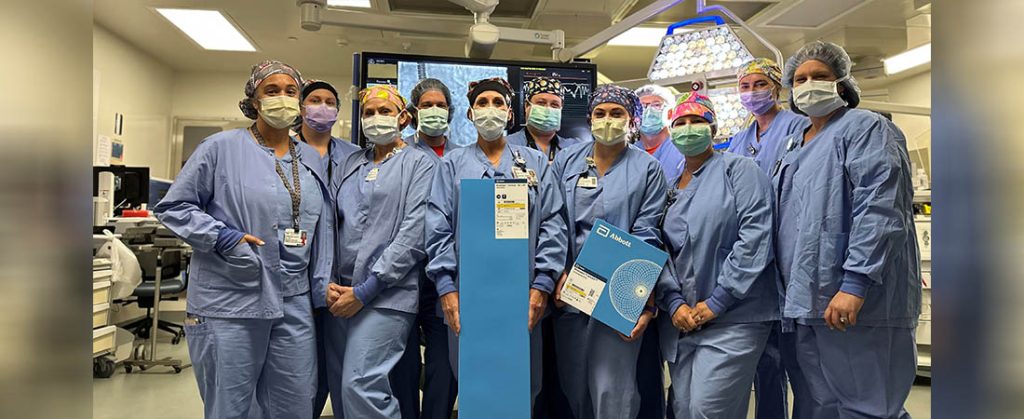
The heart team at CarolinaEast Health System announced they are now offering Abbott’s Amplatzer Amulet Left Atrial Appendage (LAA) Occluder as a minimally invasive therapy to treat people in the U.S. with atrial fibrillation (AFib) who are at risk of ischemic stroke. The device uses dual-seal technology to completely and immediately seal the LAA, so blood-thinning medication is not needed following the procedure. Amulet has the widest range of occluder sizes on the market and can accommodate different patient anatomies. It is also recapturable and repositionable to help ensure optimal placement.
Dr. Josh Kramer, Interventional Cardiologist at CarolinaEast Heart Center, successfully performed the first procedure at CarolinaEast Medical Center on June 8, 2023. “It is an honor to be the first physician at CarolinaEast to implant the Amplatzer Amulet Left Atrial Appendage Occluder device,” Dr. Kramer said. “In fact, we are the first hospital within a nearly 100-mile radius to offer this exciting technology. This therapy is truly remarkable for patients who may not be able to tolerate long-term anticoagulation.”
AFib occurs when the upper chambers of the heart (atria) beat out of coordination with the lower chambers (ventricles) and contract rapidly and irregularly. In some people with AFib, the LAA – a small, naturally occurring pocket connected to the upper left chamber of the heart – can allow blood to pool and increase the likelihood of a clot formation, which can travel to the brain and cause a stroke. For patients with AFib who are unable to take blood thinners long-term, physicians may perform procedures to prevent blood clots from leaving the LAA to reduce the risk of stroke.
“I had zero complications from the procedure and the friendly and knowledgeable staff at the hospital and offices made me feel more than confident they could handle anything that came up,” said Mr. Henry McLaurin of Jacksonville, the first patient to receive this life-changing therapy at CarolinaEast. “I am looking forward to being more active and feel comfortable going on with everyday life without taking certain medications I was on due to AFib. I plan to live life to the fullest.”
Abbott recently announced that the Amplatzer Amulet LAA Occluder received FDA approval.
By Brandy Popp

